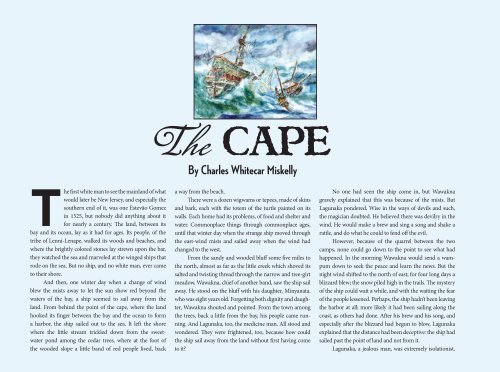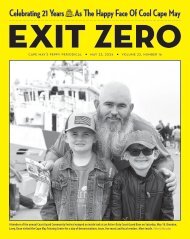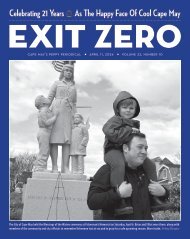Cool Cape May 2021-22
Create successful ePaper yourself
Turn your PDF publications into a flip-book with our unique Google optimized e-Paper software.
summer events [47]<br />
The CAPE<br />
By Charles Whitecar Miskelly<br />
The first white man to see the mainland of what<br />
would later be New Jersey, and especially the<br />
southern end of it, was one Estevão Gomez<br />
in 1525, but nobody did anything about it<br />
for nearly a century. The land, between its<br />
bay and its ocean, lay as it had for ages. Its people, of the<br />
tribe of Lenni-Lenape, walked its woods and beaches, and<br />
where the brightly colored stones lay strewn upon the bar,<br />
they watched the sea and marveled at the winged ships that<br />
rode on the sea. But no ship, and no white man, ever came<br />
to their shore.<br />
And then, one winter day when a change of wind<br />
blew the mists away to let the sun show red beyond the<br />
waters of the bay, a ship seemed to sail away from the<br />
land. From behind the point of the cape, where the land<br />
hooked its finger between the bay and the ocean to form<br />
a harbor, the ship sailed out to the sea. It left the shore<br />
where the little stream trickled down from the sweetwater<br />
pond among the cedar trees, where at the foot of<br />
the wooded slope a little band of red people lived, back<br />
a way from the beach.<br />
There were a dozen wigwams or tepees, made of skins<br />
and bark, each with the totem of the turtle painted on its<br />
walls. Each home had its problems, of food and shelter and<br />
water. Commonplace things through commonplace ages,<br />
until that winter day when the strange ship moved through<br />
the east-wind mists and sailed away when the wind had<br />
changed to the west.<br />
From the sandy and wooded bluff some five miles to<br />
the north, almost as far as the little creek which shoved its<br />
salted and twisting thread through the narrow and tree-girt<br />
meadow, Wawakna, chief of another band, saw the ship sail<br />
away. He stood on the bluff with his daughter, Minyanata,<br />
who was eight years old. Forgetting both dignity and daughter,<br />
Wawakna shouted and pointed. From the town among<br />
the trees, back a little from the bay, his people came running.<br />
And Lagunaka, too, the medicine man. All stood and<br />
wondered. They were frightened, too, because how could<br />
the ship sail away from the land without first having come<br />
to it?<br />
No one had seen the ship come in, but Wawakna<br />
gravely explained that this was because of the mists. But<br />
Lagunaka pondered. Wise in the ways of devils and such,<br />
the magician doubted. He believed there was devilry in the<br />
wind. He would make a brew and sing a song and shake a<br />
rattle, and do what he could to fend off the evil.<br />
However, because of the quarrel between the two<br />
camps, none could go down to the point to see what had<br />
happened. In the morning Wawakna would send a wampum<br />
down to seek the peace and learn the news. But the<br />
night wind shifted to the north of east; for four long days a<br />
blizzard blew; the snow piled high in the trails. The mystery<br />
of the ship could wait a while, and with the waiting the fear<br />
of the people lessened. Perhaps, the ship hadn’t been leaving<br />
the harbor at all; more likely it had been sailing along the<br />
coast, as others had done. After his brew and his song, and<br />
especially after the blizzard had begun to blow, Lagunaka<br />
explained that the distance had been deceptive: the ship had<br />
sailed past the point of land and not from it.<br />
Lagunaka, a jealous man, was extremely isolationist.


















